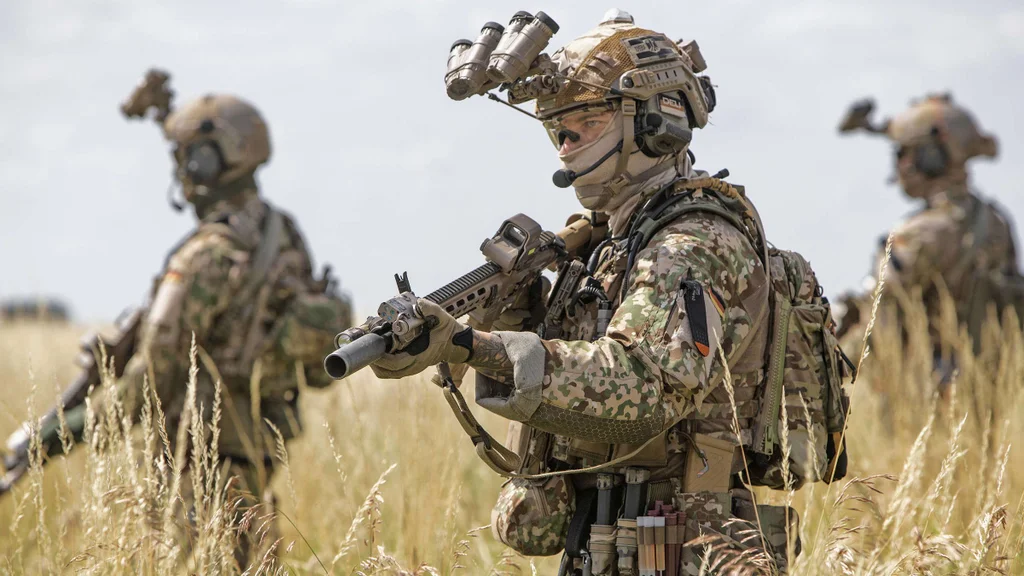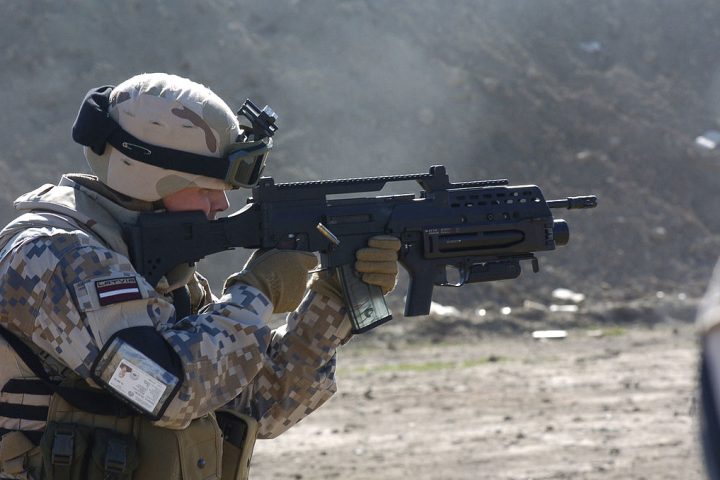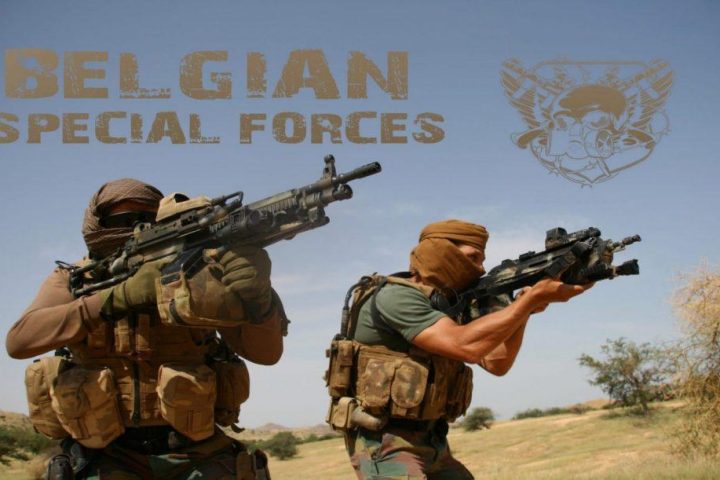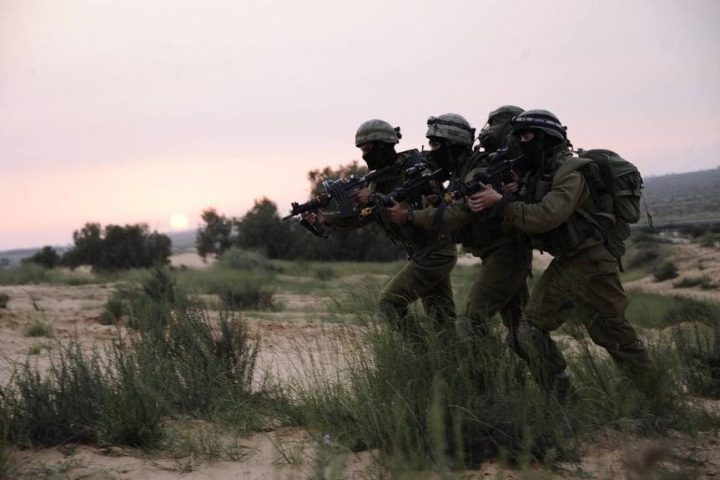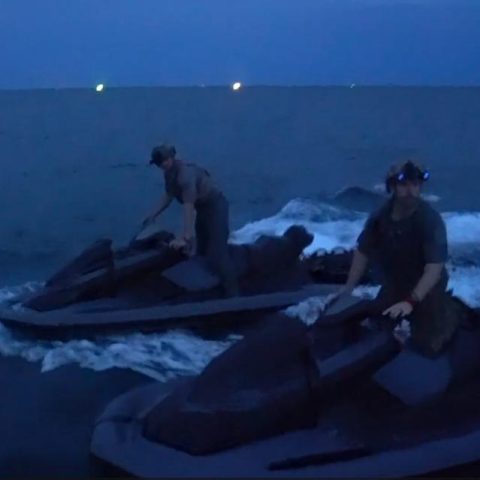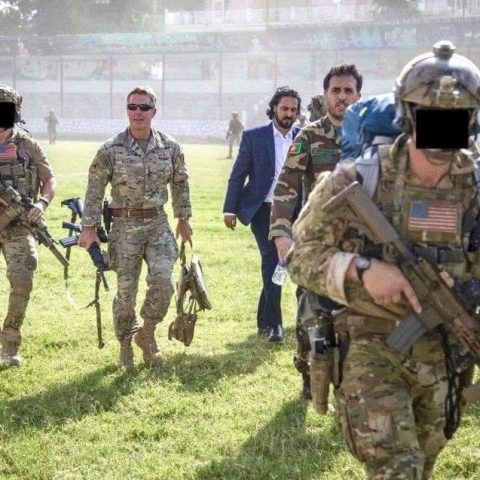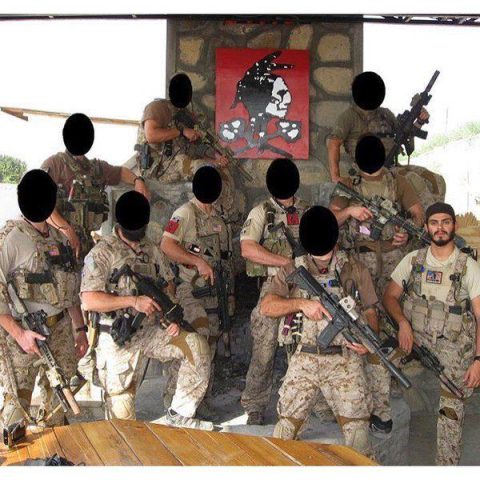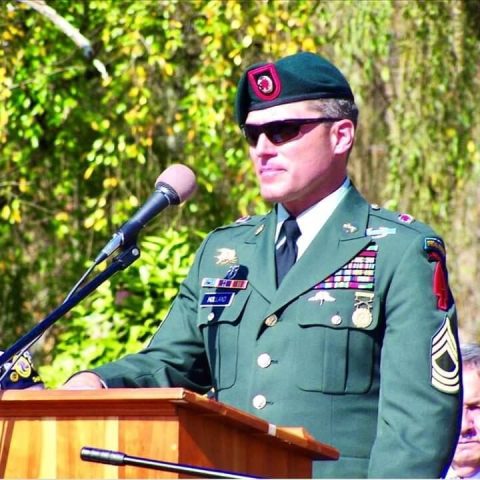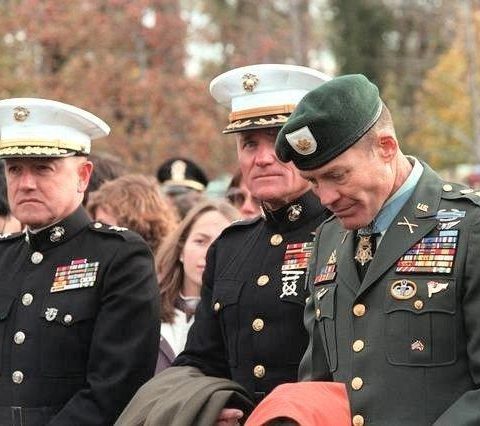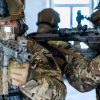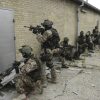Kommando Spezialkräfte (KSK) is a highly trained and secretive special forces unit of the German Armed Forces. Established in 1996, the KSK comprises operators who have undergone rigorous training and selection to conduct various special operations, including counter-terrorism, hostage rescue, and special reconnaissance.
Introduction
KSK Kommando Spezialkräfte (Special Forces Command, KSK) is elite special forces military unit composed of special operations soldiers handpicked from the ranks of Germany’s Bundeswehr and organized under the Rapid Forces Division. KSK has received many decorations and awards from NATO, the United States, and its affiliates. KSK operatives are frequently requested for joint anti-terror operations, notably in the Balkans and the Middle East.
With Kommando Spezialkraefte as a military unit, Germany gained the ability to participate in NATO exercises and perform cross-border interventions where units like GSG 9 are not legally allowed to act (as was the case in the famous rescue of hostages from a Lufthansa Boeing 737 plane in Mogadishu in October 1977)
History
The origins of the KSK can be traced back to the mid-1970s when the German military began to develop its special forces capabilities. At the time, German soldiers were often sent on special operations as part of NATO or UN missions, but they did not have their own dedicated special forces unit. This changed in 1996 when the KSK was officially established as a unit of the German Armed Forces.
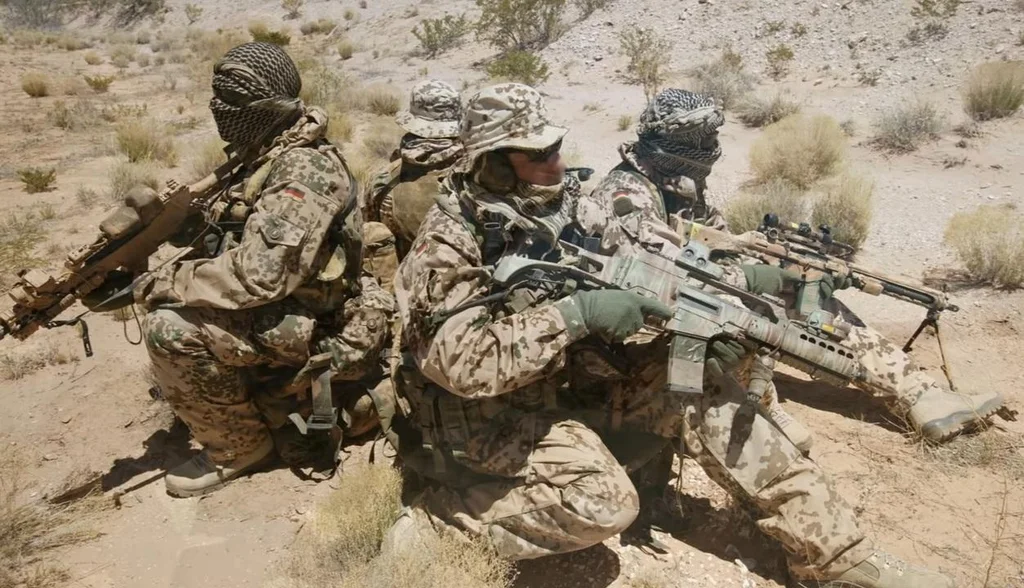
Despite all the difficulties Germany faced in rebuilding its armed forces after World War II, the Bundeswehr established its formal parachute component only in 1956. The Parachute Division has formed of two parachute brigades: the 25th Brigade (Swartzwaldbrigade) and the 26th Brigade (Saarlandbrigade).
In the early 1970s, Germans strengthened the airborne division by adding the 27th Parachute Brigade. This reinforced division was later joined by the 31st Infantry Brigade, which was reorganized under a new name: the 31st Parachute Brigade. Its members were given red berets, the universal emblem of parachute troops. The German parachute troops were the source of the personnel for establishing a special military unit called Kommando Spezialkrafte, better known by its abbreviation KSK, was drawn.
The unification of the two German states significantly increased Germany’s influence beyond its borders, leading to the need for the creation of military units like the KSK. German military experts have been moving toward establishing special forces capable of responding quickly to incidents and crises involving German citizens, both on German territory and abroad, and protecting German national interests worldwide. The unit should also be capable of operating in environments for which regular German military forces are not trained, such as the jungle or desert. KSK was established to meet these tactical requirements.
According to some reports, a key factor that led the German Bundeswehr and political leadership to establish the KSK unit was an unpleasant experience in 1994 during the Rwandan civil war. During the conflict in Rwanda, Belgian and French special forces and paratroopers had to rescue between 10 and 11 German citizens because the German Army did not have appropriate and available forces for this purpose. When establishing the unit, the first commander of KSK emphasized the need to recruit mature, reliable, and secure soldiers for this unit.
Despite its tactical and operational capabilities in resolving hostage situations, KSK is primarily a military unit with military missions – unlike the GSG-9 counter-terrorism division. KSK also includes a so-called “Hostage Rescue Team” capable of solving diverse and complex tasks of this kind. GSG-9, or Grenzschutzgruppe 9, and the state police are the ones who are on the frontlines in the fight against domestic and international crime, as well as terrorism.
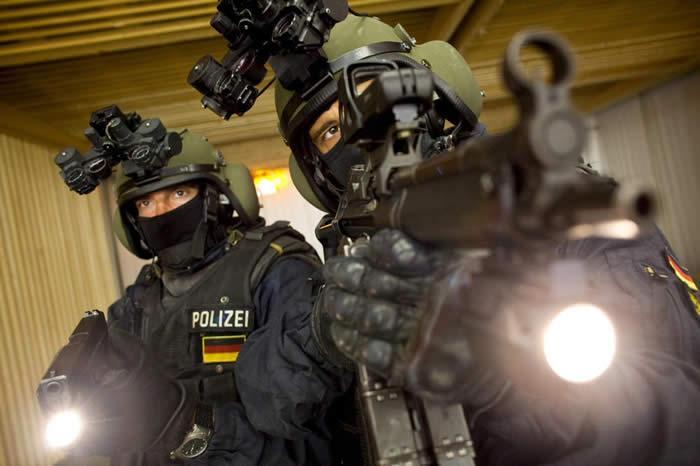
GSG-9 was formed in 1972 after the Munich Olympics tragedy and fell under the jurisdiction of the Federal Border Guard, which is prohibited by law from carrying out military operations abroad. The state police are only authorized for regular policing within their legislative authority. According to some sources, GSG-9 has about 250 operators divided into three groups. In the 1,300 operations, they have confirmed (many are still secret), German sources claim that only in four cases have firearms been used – two confirmed cases of interventions in Mogadishu in 1977 and two other members of the RAF in 1994.
Before the KSK’s formation, the West German (and later German) government assigned all counter-terrorist and special operations activities to the GSG 9, a highly trained police force created shortly after the hostage-taking during the 1972 Munich Olympic Games. Before 1973, the Army’s Fernspäher (Long-Distance Reconnaissance), the navy’s Kampfschwimmer (Combat Swimmers/”Frogmen”), and (until 1989) the Special Weapons Escort Companies—Sonderwaffenbegleitkompanien were the only military units comparable to anything that other nations may have seen as dedicated special forces units.
Training and selection
The training and selection process for KSK members is extremely demanding; only a small number of applicants are accepted each year. Candidates must pass a grueling physical fitness test and a series of psychological evaluations. If they pass these initial stages, they undergo a year-long training program, including combat diving, martial arts, and advanced weapons and tactics training. Only the best candidates are selected to become members of the KSK.
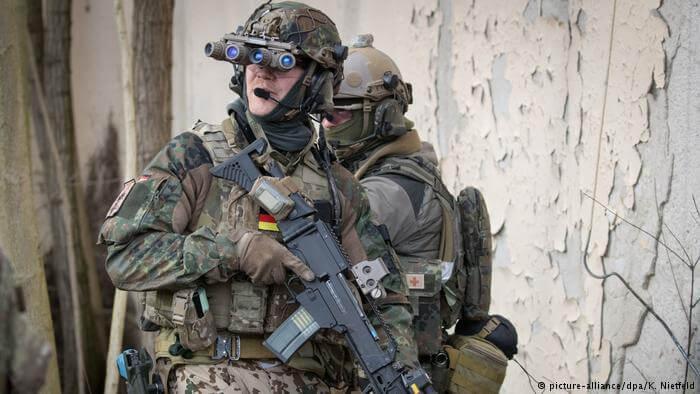
The training of the troops belonging to Kommando Spezialkraefte takes approximately three years. It includes, among other things, training in parachute HALO/HAHO (high-low altitude open and high-high altitude open) jumps and scuba diving.
Selection
The selection process and training of new commando candidates take about three months. It is a modified version of the British SAS and the US Army Special Forces selection and training process for their members. Before a newcomer candidate can attend the KSK course, they must meet several general and special requirements:
- Officers must be no older than 30, and non-commissioned officers no older than 32.
- Candidates can come from any part of the Army.
- Candidates must have basic parachute training.
- Candidates must be prepared to serve voluntarily for a minimum of 6 years in the Kommando Spezialkraefte forces.
- All officers and senior NCOs (Staff Sergeants and Officer’s governors) must have a 1-A Einzelkaempferlehrganag combat course.
The selection process at the Calw center in Swartzvaldu includes the following:
- First, one day of psychological testing (computer test)
- Second, one week of selection
- Third, two days of testing basic physical abilities:
- One minute of the maximum possible number of pull-ups
- One minute of the maximum lifting of the fuselage
- 3 x 10-meter sprint
- Jump off the point
- 12 minutes of running
- Fourth, swimming freestyle: 500 meters – less than 15 minutes
- Fifth, crossing the barriers of standard German infantry for a maximum of 1:40 minutes.
- Sixth, running 7 kilometers in field conditions with a 20 kg backpack for 52:00 minutes.
- Seventh, additional laboratory tests (3 days)
The basic Commando Course I
During this initial commando course, also known as the one-week SERE course, candidates are put under extreme conditions involving a 100 km march that must be completed in four days, carrying a heavy load, and facing unexpected situations that they must successfully resolve, such as crossing a river, swimming and diving with a weapon, and navigating sudden ambushes during the day and at night. This initial course also includes further psychological observation of candidates, their behavior under stress, and their reactions.
The basic Commando Course II
This part of the basic course consists of three weeks of combat survival training and is carried out at an international school for deep military reconnaissance in Pfullendorf, Germany. Candidates must complete all specialized courses and training before being admitted to Kommando Spezialkraefte and assigned to one of the operating teams. Finally, some attend training in fast and safe driving techniques on all surfaces (asphalt, ice, mud, gravel).
Mission
Once they have completed their training, KSK members are prepared to conduct a wide range of special operations, including counter-terrorism, hostage rescue, and special reconnaissance. The unit is highly secretive and is not often mentioned in the media, so it is difficult to know exactly what operations they have been involved in. However, it is known that the KSK has been deployed on missions in Afghanistan, Kosovo, and other conflict zones worldwide.
KSK operates under the control of the German Crisis Department and conducts actions similar to those carried out by US Special Forces or British SAS. These actions include:
- Defense of NATO territory in Germany
- Action during the deterioration and escalation of crises
- Operations in the creation/maintenance of peace or crisis management
- Support to the civilian authorities in the fight against terrorism or other types of crime
- Participation in international peacekeeping operations
Operations
Since the 1990s, the German Bundeswehr has been actively involved in peacekeeping operations abroad. The hardest task in these missions is entrusted to the members of Kommando Spezialkraefte or KSK.
Like all German military units, KSK deployments require German Bundestag (Federal Assembly) authorization. The unit has engaged in numerous anti-terror campaigns in Europe and abroad; known engagements include operations inside Kosovo, Bosnia and Herzegovina, and, most recently, in Afghanistan.
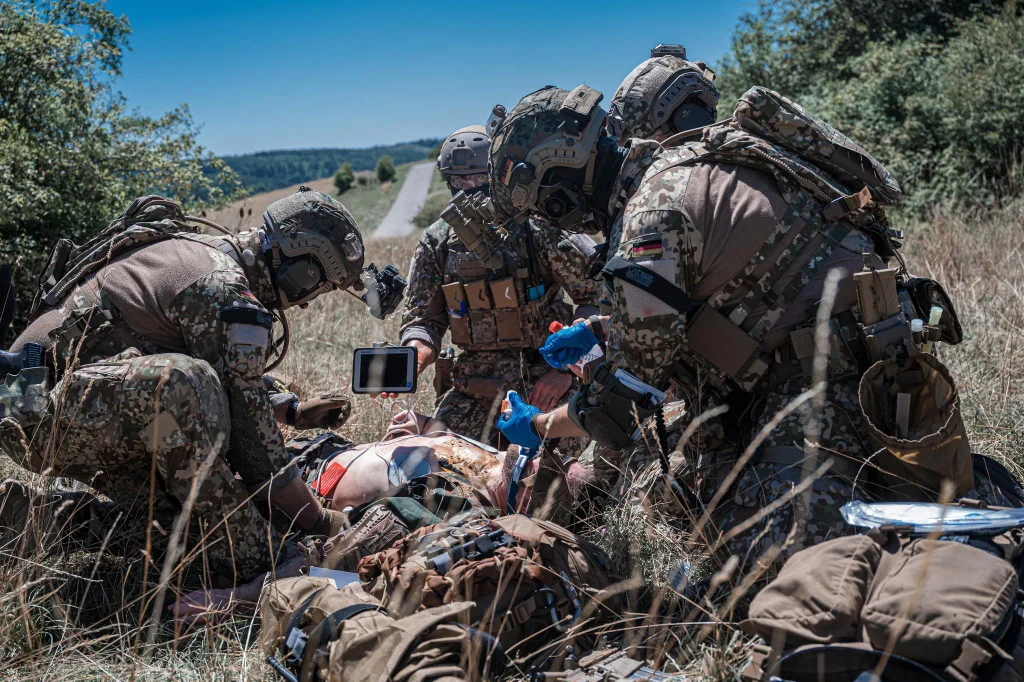
During the War in Afghanistan, although nominally under OEF command, the KSK worked under ISAF command since 2005, carrying out numerous operations in the vicinity of the German deployment in Kabul, including a successful raid on an al-Qaeda safe house for suicide bombers in October 2006. KSK operators have commented in the German media about the restrictions placed on them by their national caveats and stated a preference for working directly for the Americans as part of OEF-A as they had done as part of Task Force K-Bar.
As is to be expected with such units, specific operational details such as success and casualty rates are considered top secret and withheld even from the highest-ranking members of the Bundestag. This practice has elicited some serious concerns, resulting in an agreement to increase transparency and accountability by disclosing mission details to selected members of the Bundestag in relation to the future deployments of KSK forces.
On May 4, 2013, the KSK reported its first casualty. First Sergeant Daniel Wirth was fatally shot in Baghlan Province, Afghanistan, during operation “Maiwand.” US Army forces were part of the attempted rescue mission. Daniel Wirth was honored by his sister Kathrin Wirth-Torrente in a book titled “Brothers in Bravery.”
It tells her brother’s story and reflects on 40 additional military members who lost their lives while fighting The Global War on Terror in the Greater Middle East. The Travis Manion Foundation published the book in September 2017.
Organization
Kommando Spezialkräfte
- KSK Staff
- Psychological Service
- Language Service
- Staff and Command Support Company
- 1st Commando Company
- 3rd Commando Company
- 4th Commando Company
- Special Commando Company
- Special Reconnaissance Company
- Signal Company
- Support Company
- Quartermaster/ Handling Platoon
- Maintenance Platoon
- Parachutes/ Air Handling Platoon
- Medical Center
- Training Department
- Development Department
In 2020 the 2nd Commando Company was dissolved “after an accumulation of incidents and a notable build-up of right-wing extremists in the unit.”
Operational forces
Combat-ready units are divided into three commando companies of approximately one hundred men. Each of the three commando companies has five specialized platoons, each with a unique specialty and ability that can be adapted to both the terrain and situation, depending on the type of action(s) required:
- Command Platoon
- 1st Platoon: vehicle insertion
- 2nd Platoon: airborne insertion
- 3rd Platoon: amphibious operations
- 4th Platoon: operations in special geographic or meteorological surroundings (desert, jungle, mountain, or arctic regions)
- 5th Platoon: reconnaissance, intelligence operations, and sniper/counter-sniper operations
There are four commando squads in every platoon. Each of these squads consists of four equally skilled members that have been hand-picked from the German Army into the platoon that best suits their abilities. Each squad member is specially trained as a weapons expert, medic, combat engineer, or communications expert, respectively. Additionally, some groups may contain other specialists, such as heavy weapons or language experts.
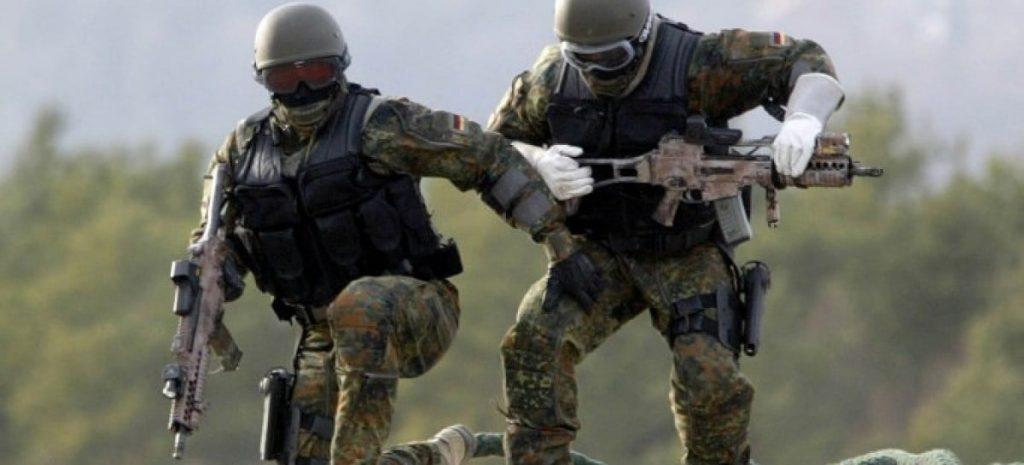
Special Commando Company
The special commando company was established in 2004. This company is staffed with specially trained KSK personnel in the fields of Joint terminal attack controller, IED disposal, or handling of military working dogs, which may support operations of the commando companies as required. KSK personnel serving in the special commando company are commonly seasoned hands, having previously served in one of the three commando companies.
Special Reconnaissance Company
The Special Reconnaissance Company is staffed with KSK members and further personnel specialized in reconnaissance. This company may support the operations of the three commando companies with reconnaissance and surveillance abilities, for instance, using UAVs. Female members may also operate as Female Engagement Teams if the task is required.
Support forces
The HQ & Support Company is responsible for supply duties in Germany. For that, the unit is made up of the following:
- HQ Platoon
- Material Platoon
- Supply Echelon
- Catering Section
- Transport Platoon
- Ammunition and Refueling Platoon
The Signal Company consists of three signal platoons.
While the HQ & Support Company supports the KSK in Germany, the Support Company takes on supply duties during operations. Therefore, the company is organized in:
- Repair Platoon
- Supply Platoon
- Parachute Equipment Platoon
Weaponry and Equipment
To carry out various tasks, KSK operators must be trained and prepared to use various weapons and equipment. The unit uses the standard camouflage uniforms of the German Army, black NOMEX coveralls, and Fritz kevlar helmets. Among other things, KSK operators also use a modified helmet that incorporates a 52/SL SEM communications system. KSK operators are trained in using a broad range of German military weapons specifically ordered for them.
The vehicles used by Kommando Spezialkraefte include two-tone Unimog trucks and off-road Mercedes G-230 WA cars. During helicopter operations, Kommando Spezialkraefte mainly uses Bell-220 and Sikorsky CH-53 helicopters from the German Luftwaffe.
Controversies
In 2018, the German Federal Criminal Police Office uncovered a plot involving unknown KSK soldiers to murder prominent German politicians such as Claudia Roth, Heiko Maas, and Joachim Gauck, among others, and carry out attacks against immigrants living in Germany. Also, earlier that same year, in a separate investigation, the State prosecutors in Tübingen investigated whether neo-Nazi symbols were used at a “farewell” event involving members of KSK.
In June 2020, German defense minister Annegret Kramp-Karrenbauer announced that the unit would be partially disbanded due to growing far-right extremism within the ranks. The KSK had become partially independent from the chain of command, with a toxic leadership culture. One of the force’s four companies where extremism is said to be the most rife was to be dissolved and not replaced.


